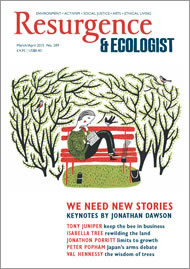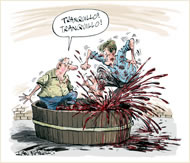There’s one thought at the front of my mind. Will it taste of diesel? It’s the big moment. I’m at the Transition Town Kensal to Kilburn open meeting, and they’re about to try the first-ever bottle of my pride and joy – six months in the making, our neighbourhood’s own, crowd-sourced, red wine. Their glasses are full. But no one is drinking. “Tell us about the wine,” suggests Michael, doyen of the Brent Transition movement. It had been a long time fermenting.
Back in May I read a story about Anne Leitrim, an old woman who had lived and died – alone – in Bournemouth. It was six years before they found her body. How many neighbours have I got, I asked myself, who would knock on my door? The answer was, none. On the street, I tried to strike up with a neighbour whose face I recognised. “I know you,” she said. “You’re the guy on his mobile phone all the time.” Like I said, zilch.
In June I snapped my Achilles tendon playing cricket. The big lesson I took away? Never exercise. But walking solves everything, St Augustine told us, and over the weeks I walked on crutches around the local park and streets, and I noticed the apples and grapes growing all over the place. One day, in the park, I was overtaken by an 80-year-old Italian man. Later I would learn he had gout. “Excuse me,” I said on impulse, “but do you know how to make wine?” He turned to face me. “The soles of my feet”, he replied, “are still red from making wine as a boy.” We were off. We were going to be winemakers. Forget Bourgogne. Forget Bordeaux. Think the rolling vineyards of Brent, the Napa Valley of the North.
The old man’s name is Paulo Sentini. He lives two doors down from me. He last made wine in 1955, in his village in Emilia-Romagna. Now he was doing it again. With 45 neighbours, we picked and trampled 400 pounds of local Fragolina grapes, our legs blood-red as we emerged barefoot from the barrel. There are now 200 bottles-worth sitting in our giant old glass demijohns. Unthinkable Drinkable Brent, we’re calling the project, with “NW6” our planned label. But is it more like Brent Crude?
My intro is over. They inhale. They drink. They pause. Some blink. Then George says the magic words, “It’s wine.” Farhang nods. “What about getting Parlour to serve it?” someone throws in. What about the bar at the Lexi, our local cinema?
The next hour is a double pleasure. I watch the big carafe go slowly down, and I get to catch up on the latest goings-on. Alex gives the highlights of her Restart Party. You bring your broken electronic gadgets; local technicians fix them. “It’s about rediscovering skills,” she tells us, “getting us out of the pockets of the big brands and the model of built-in obsolescence.” There’s an update on our own Edible Overground at Brondesbury, the hops and artichokes jostling for space with the Oyster card sign-in stand. Next, Carol talks of a project to record the voices of the elderly all round Brent. It’s an archive, but it’s also an instruction. There’s a generation still alive that had a totally different take on how to live, how to grow, how to cook, how to mend, how to connect.
Carol’s project reminds me of something Paulo said to me. One evening in the late summer we set up the Torchio, the giant press to squeeze the skins for the sweetest wine of the barrel. I had started to crank it, giving it some welly, when Paulo touched me on the shoulder gently. “Tranquillo, tranquillo,” he said to me. Slowly, slowly.
Martin Buber, the German philosopher, spoke of two ways of looking at the world. The first he called “I and It”, where there’s you and there’s things that are there for you, separate and disconnected. The second he called “I and Thou”, where you and the entities around you are connected and interdependent. Buber’s point is that if we don’t acknowledge the ‘Thou’ in others, our own ‘I’ becomes reduced to an ‘It’. Tranquillo, Paulo was telling me. These grapes weren’t an ‘It’, to be plundered. They were ‘Thou’. They give their juice to the winemaker when they choose.







